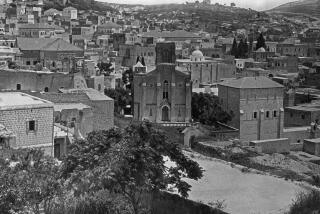‘The Thunderish Crash of Broken Glass . . . Disaster Had Struck’
- Share via
On Nov. 9, 1938, I was 10 years old and lived in the small town of Prenzlau, about 100 kilometers north of Berlin in Germany. My name was Hans Sinasohn.
I was at least the sixth generation of Sinasohns in Prenzlau because my great-great-great, great-great, great and grand fathers all had markers in the Prenzlau Jewish cemetery.
Prenzlau was not a modern town at that time. The streets were cobblestoned, the buildings were old and there was a 600-year-old church behind our house.
My family was religiously observant. My father attended morning services at least twice during the week, and of course Sabbath services were never missed by us. I started religious after-school training when I was 5.
I had attended public school for about four years and never ever really incurred any anti-Semitism in school or in town that I can recall. My father was a pelt dealer; my mother was a stay-at-home mother and a hausfrau. I was a regular German kid who received a public and Jewish education and was only allowed to play after my schoolwork was completed and checked for form and accuracy by my parents.
On that night in November, it was getting cold outside and I had gone upstairs to bed when I was awakened by the thunderish crash of broken glass downstairs. I could not understand what disaster had struck. My mother yelled up to me: “Bleibe da oben!” (Stay up there) and I hid under my goose-feather comforter trying to shut out the outside world.
After the noise had finally stopped, I went downstairs. My mother was there, but not my father. “Wo ist Vati?” (Where is Father?) I asked, and my mother reassured me that he would soon be back. My father’s store was in front of our living quarters and its 15-foot shop window had been smashed. Glass was all over. The next morning, I saw a big red “JUDE” painted on the sidewalk in front of the store.
My mother kept me home the next day because she probably felt it was not safe for me to go outside, but then also, by public notice, all Jewish children were forbidden to attend public school.
I was told that our 100-year-old synagogue had been burned down that night, including the 35 or 40 torahs in the ark. I was told to stay in the house, so I never did get to see the destroyed building.
So now there was no school, no temple and no father.
A few days later my father came back and matter of factly said: “They let me go when they realized that I am a good German.”
This may sound odd to you, but having his family live in this town for at least 150 years, having served as a soldier and being wounded in World War I, having his father serve the Vaterland in the war against France in 1870, he most definitely considered himself a true German. His allegiances were to God and the Vaterland and this was evidenced by two paintings of my grandfather that hung in our house. One was in his 1870 soldier’s uniform and the other showed him in prayer, shawl-covered in a cantorial habit.
But the cataclysmic events must have shattered my father’s convictions. He always considered education paramount and now there was no school for his son. He could no longer practice his religious faith. The lunatics had apparently taken over the running of the asylum.
I was restricted to our house while, unbeknownst to me, my parents undertook measures to get me away from that sudden madness and to see to it that I might have a life. It was arranged for me to be sent out on a Kindertransport (children’s transport) and on Jan. 31, 1939, just 2 1/2 months after Kristallnacht and just after my 11th birthday, I said goodbye to my parents, never to see them again.
They were subsequently deported to the Warsaw ghetto.
More to Read
Sign up for Essential California
The most important California stories and recommendations in your inbox every morning.
You may occasionally receive promotional content from the Los Angeles Times.













